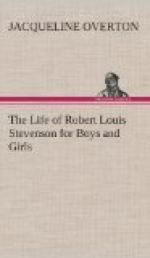“I enjoyed myself more than I could have hoped on board our floating menagerie; stallions and monkeys and matches made our cargo; and the vast continent of the incongruities rolled the while like a haystack; and the stallions stood hypnotized by the motion, looking through the port at our dinner table, and winnied when the crockery was broken; and the little monkeys stared at one another in their cages ... and the big monkey, Jacko scoured about the ship and rested willingly in my arms ... the other passengers, when they were not sick, looked on and laughed. Take all this picture, and make it roll till the bell shall sound unexpected notes and the fittings shall break loose in our state rooms, and you have the voyage of the Ludgate Hill. She arrived in the port of New York without beer, porter, soda-water, curacoa, fresh meat, or fresh water, and yet we lived and we regret her.”
After a short visit with friends in Newport they returned to New York and settled down for a time in the Hotel St. Stephen, on 11th Street, near University Place, to make plans for their winter’s trip.
Soon after their arrival “Jekyll and Hyde” was dramatized and produced with great success. When it was known that the author of this remarkable story was in the city, people flocked from all sides to call on him, and fairly wearied him with their attentions, although he liked to see them and made many interesting acquaintances at the time.
Washington Square was one of his favorite spots in New York, and he spent many hours there watching the children playing about. A day he always recalled with special pleasure was the one when he had spent a whole forenoon in the Square talking with Mark Twain.
Among those who were anxious to know Stevenson was the American sculptor Augustus St. Gaudens. He had been delighted with his writings and regretted he had not met him in Paris when he and Mr. Low had been there together. “If Stevenson ever comes to New York,” he said to Mr. Low, “I want to meet him,” and added that he would consider it a great privilege if Stevenson would permit him to make his portrait.
It was with much pleasure, therefore, that Mr. Low brought them together, and they took to one another immediately. “I like your sculptor. What a splendid straightforward and simple fellow he is,” said Stevenson; and St. Gaudens’s comment after their first meeting was: “Astonishingly young, not a bit like an invalid and a bully fellow.”
Stevenson readily consented to sit for his portrait, and they spent many delightful hours together while the sketches were being made for it.
One day the sculptor brought his eight-year-old son, Homer, with him, and years afterward gave the following description of the child’s visit:
“On the way I endeavored to impress on the boy the fact that he was about to see a man whom he must remember all his life. It was a lovely day and as I entered the room Stevenson lay as usual on rather a high bed. I presented Homer to him ... but since my son’s interest, notwithstanding my injunctions, was to say the least far from enthusiastic, I sent him out to play.




